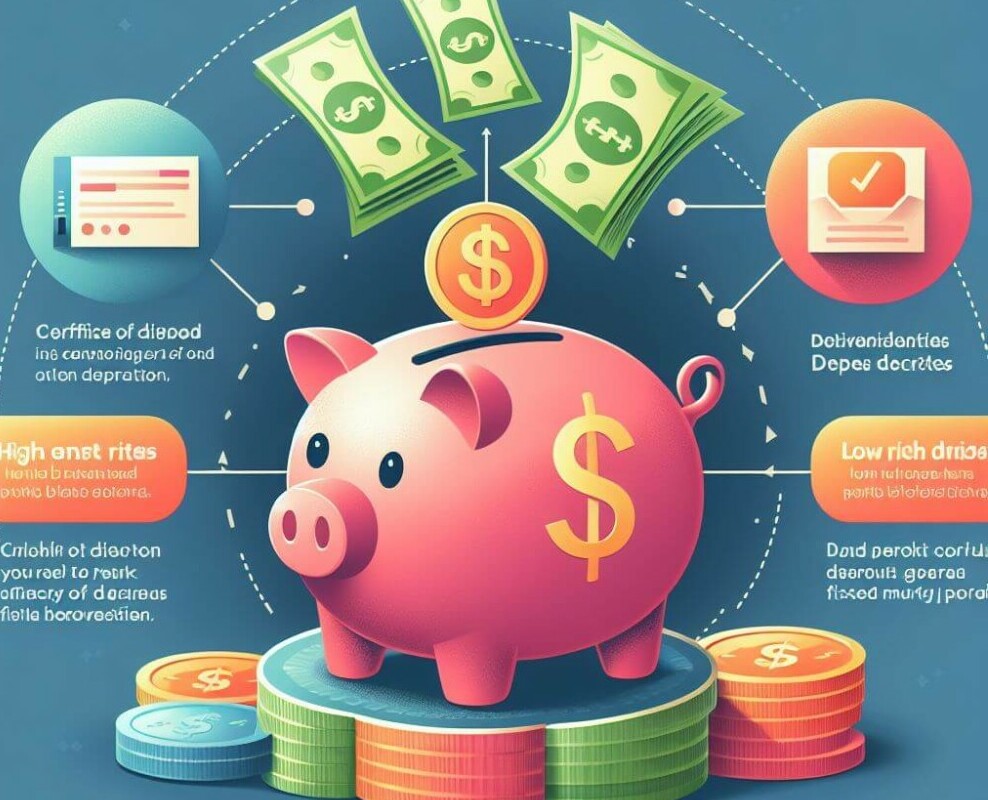Hi and welcome to this post where we will be talking about some low-risk investments for retirees,
It’s not just about safety, but also essential for you as a retiree seeking peace of mind. At this stage of life, focusing on investments that won’t keep you up at night worrying about market swings is crucial won’t keep you up at night worrying.
What are The 4 Best Low-Risk Investments For Retirees?
The first one is bonds. Then the second option is a lower risk factor than stocks which is dividend-paying stocks. Then you can have a secure investment such as a certificate of deposits. And the last option is investing in money market accounts and funds.
At the same time, it’s about investing in assets that will provide a steady income, preserve your capital, and align with a more conservative approach that’s typical as you retire.
It’s important to balance the scales between safety and growth regarding your retirement nest egg.
After all, as a retiree, you face a unique financial challenge: you need to protect your savings from inflation, yet you can’t afford to lose the money you’ve worked so hard to accumulate over the years.
It’s about finding that sweet spot where your investments can still grow, albeit modestly, while not exposing you to high levels of risk.
I’ll also help you prioritize stability and income through various investment vehicles. This isn’t just about stashing your cash under the mattress; it’s about making smart choices that ensure your money is working for you, providing financial security without the roller coaster ride. These strategies demand attention because they will shape your quality of life in retirement.
In the upcoming section, I’ll introduce you to the stable yet often underrated world of bonds. Bonds can be a cornerstone for a retiree’s investment strategy, offering a blend of predictability and reliability that’s hard to beat when the objective is preserving capital.
So if you want to start laying the groundwork for a rock-solid investment future, keep your eyes peeled as we move to the next section.
FREE 4-STEP “CHEAT SHEET” :
Want To Build a PROFITABLE Online Business(but don’t know where to start?)
The Stability of Bonds for Retirement Income
I’m going to kick things off by highlighting the ins and outs of bonds for retirement income. As a retiree, you probably appreciate investments that give you less heartburn at night, and that’s where bonds come into play.

They’re known for their stability, making them a cornerstone of many retirement portfolios. But let’s not forget the goal isn’t just to keep your money safe; it’s about earning income from it too.
Don’t worry too much about the jargon here. When I talk about government and corporate bonds, you’re lending money to these entities, and in return, they’re paying you interest.
Pretty straightforward, right?
Now, you’ve got options: You can pick individual bonds or diversify quickly through bond funds. Either way, you’re looking at steadier returns, albeit often lower than what you might potentially pull from stocks.
Diving into the risk versus return profile, bonds are generally seen as less risky than stocks. But there’s a catch. Not all bonds are created equal.
For instance, U.S. Treasury bonds are considered super safe since they’re backed by the government, while corporate bonds can be a bit more of a wild card, depending on the company’s stability.
So, this brings the question, how do bonds fit into your overall retirement game plan?
They provide regular interest payments, which can be a reliable source of income, along with your Social Security or pension. Plus, when the stock market decides to throw a tantrum, bonds often stay pretty cool, which can help balance out your investment returns over time.
However, do take note, that bonds are not entirely risk-free. Interest rates, inflation, and creditworthiness of the issuer can all impact bond prices.
However, by carefully selecting bonds that align with your risk tolerance and investment goals, you can leverage their strengths to build a secure and income-generating bridge to your retirement dreams.
Recommended Reading: Best Online Side Hustles for Seniors
Dividend-Paying Stocks: A Blend of Growth and Income
When it comes to investing after you retire, you might consider dividend-paying stocks as a significant part of your portfolio.

These stocks offer a unique blend of potential growth and a consistent stream of income, which can help to supplement your retirement funds.
Companies that have a history of paying dividends are often well-established and financially stable, which contributes to the lowered risk factor these stocks can represent.
In my opinion, one of the smart strategies to employ with these dividend-payers is to take advantage of Dividend Reinvestment Plans (DRIPs). DRIPs allow you to use the dividends you earn to purchase more shares of the company, often without paying a brokerage fee.
This can lead to compounding growth over time as you accumulate more shares and, in turn, earn dividends on those additional shares.
But keep in mind, that even the most stable dividend-paying stocks come with their own set of risks, particularly market volatility. The company’s performance and overall market conditions can impact both the stock price and the sustainability of dividend payments.
To navigate this, choose companies that have performed well across various market conditions and perhaps consider a financial advisor’s guidance to tailor your stock picks to your specific risk tolerance and financial goals.
Transitioning from dividend-paying stocks into another robust income-producing investment, let’s talk about Certificates of Deposit (CDs). These investment products bring a different kind of stability to your retirement strategy.
Head over to the next section to learn how CDs can provide a fixed-income safety net for your investment portfolio.
Certificate of Deposit (CDs): The Fixed-Income Safety Net
When it comes to peace of mind in your investment strategy, Certificates of Deposit, or CDs, often come to the rescue.
Here’s the lowdown: CDs offer retirees a guaranteed rate of return over a specified period, and here’s the attractive part about this form of investment – your principal is safe as long as you stick within FDIC-insured limits.

A CD is quite literally like locking your money in a vault and knowing exactly how much interest it will have earned when it’s time to come out. They are a type of savings account issued by banks and credit unions. In exchange for depositing your money for a fixed term (usually ranging from a few months to several years), you earn a predetermined interest rate.
But there’s a strategy called CD laddering, which is not just about one CD, but spreading your investment across several with different maturity dates. This way, as each CD matures, you can either reinvest or use the funds as needed without locking all your money away at once.
Moreover, it’s important to keep an eye on interest rates.
Why?
Because they directly influence what you’ll earn from new CDs. If rates are rising, short-term CDs might be more beneficial, allowing you to reinvest at higher rates sooner. On the other hand, if rates are falling, snagging a longer-term CD at a higher rate could be a smart move.
Remember these tips when you go about choosing the certificate of deposit for your retirement:
- Term Length: Consider your investment goals and how soon you might need access to the money. Shorter-term CDs offer lower interest rates, while longer terms typically lock in higher rates.
- Interest Rate: Compare rates offered by different banks and credit unions to get the best return on your investment.
- Early Withdrawal Penalty: Understand the penalty fees associated with withdrawing your money before the CD matures.
Transitioning from the solid ground of CDs, there’s another option that brings more liquidity while still keeping risk low – that’s right, I’m talking about money market accounts and funds.
So, let’s explore how they can be a useful part of your low-risk investment arsenal.
Money Market Accounts and Funds: Fluidity Meets Stability
When you’re in retirement, having quick access to your funds is just as crucial as maintaining their security. This is where money market accounts come into play.
They’re not as flashy as some other investment vehicles, but they offer a nice blend of accessibility and safety for your hard-earned cash.

Money market accounts are akin to savings accounts, but with a twist: they often yield higher interest rates and come with check-writing privileges, making them a bit more flexible.
These accounts are offered by banks and credit unions.
One of the good things is that with a money market account, you have the ease of withdrawing funds, which can come in handy for unexpected expenses or opportunities that may arise during retirement.
However, there’s another option to consider: money market funds. These are mutual funds that invest in short-term, low-risk debt instruments like government treasury bills and commercial paper.
They aim for higher returns compared to money market accounts, but remember, with that potential for higher yield comes a slightly higher risk and no FDIC insurance.
If you opt for a money market fund, it’s vital to analyze its portfolio and performance history. You want to ensure you’re comfortable with the fund’s risk level in the context of your overall retirement investment strategy.
Money market accounts and funds may not be suitable for all your retirement savings needs. They are ideal for parking your emergency fund or a portion of your retirement savings that you might need to access in the short term.
Conclusion: Crafting a Diversified Low-Risk Investment Strategy for Retirement
If you’ve followed along, you now have a clear picture of some safe investment places for retirees.
As far as possible, try to diversify. It’s a good retirement strategy that aims to minimize risk while still capturing growth.
So what’s the next step?
For starters, review your investment portfolio regularly. Doing this will make sure that your investments align with your current needs and market conditions. A portfolio that was balanced five years ago might not be today.
And let’s not overlook the value of professional advice. No two financial situations are the same, and a financial advisor can tailor advice to your unique circumstances.
Whether it’s adjusting your asset allocation or exploring new investment opportunities, a trusted financial expert can be invaluable.
Retirement should be a time of relaxation, travel, and enjoying the fruits of your labor. But a solid financial foundation is essential for peace of mind. This post explored various low-risk investment options that can help you achieve your financial goals.
We talked about savings accounts, the money market, Certificates of Deposit(CDs), Bonds, and Dividend Paying Stocks.
Building Your Future Beyond Retirement Planning:
While financial security is crucial, retirement can also be a time to explore new passions and turn them into income opportunities. Perhaps you have a wealth of knowledge or a hidden talent you’d love to share with the world.
We offer a comprehensive suite of courses and resources designed to help individuals like you leverage their skills and experience to build a thriving online business. Whether you dream of starting a blog, an online course, or a consulting service, we provide the tools and guidance you need to turn your passion into profit.
Ready to explore the exciting world of online entrepreneurship?
- Consider downloading my free guide, “10 Steps To Blast Off With Your PROFITABLE Online Affiliate Marketing Business.”
I hope that you take this information to heart. A well-thought-out investment strategy can make your retirement years truly golden.
You’ve worked hard for this phase of your life – make sure your money works just as hard for you.
Wishing you everything of the best
Kind Regards and Take Care
Roopesh

